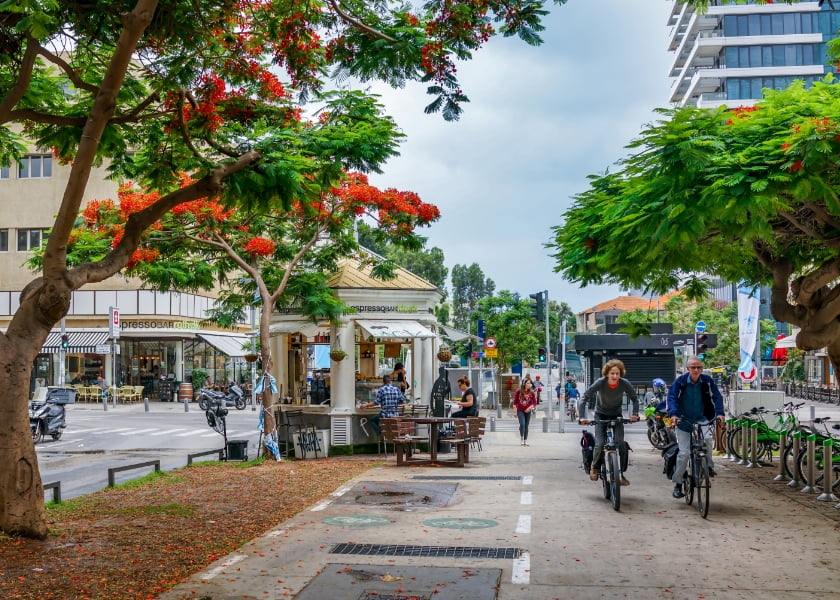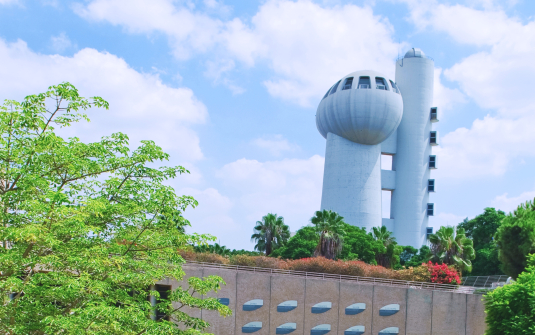
Life in Israel
History buffs can experience the Old City of Jerusalem, Crusader fortresses, Roman amphitheatres and aqueducts, and Nabatean trade routes. Nature lovers have access to exploring a wealth of ecosystems. Sports aficionados can hike, swim, surf or bike all over. Award-winning wineries and restaurants, as well as excellent music and theatre performances, can be found throughout the country. With an international reputation for entrepreneurship and innovation Israel has an extremely talented and educated workforce trained in renowned academic institutions.
-
 Embassies and Consulates
Embassies and Consulates
Embassies and Consulates
We recommend that all International guests register with their local embassy while here in Israel. Embassies & Consulates in Israel
Currency
The currency of Israel is the New Israeli Shekel (NIS)
One NIS = 100 Agorot
Coin denominations are 10 and 50 agorot, and 1, 2, 5 and 10 NIS.
Banknotes denominations are 20, 50, 100 and 200 NIS.
US dollars and Euros may also be used in popular tourist locations and change will be given in NIS, although the exchange rate will not be favourable.
Cash can be exchanged at the money changers or at the post office. Credit cards are accepted widely and ATM machines can be easily found.
Public Holidays
The standard work week in Israel is from Sunday through Thursday, and weekends are Friday to Saturday.
Israel has nine official holidays throughout the year. Jewish holidays are celebrated according to the Jewish lunar calendar, so the dates of the holidays vary slightly from year to year.
Holidays start at sunset, meaning that workplaces typically shut on the afternoon of the holiday's eve.
Collective leave is common at many companies and government offices during Chol HaMoed (the days between the first and last days of Passover and Sukkot).
School holidays typically include the day before and the day following the holiday. The Ministry of Education publishes the annual school holidays at the beginning of the school year.
-

Rosh Hashana (Jewish New Year)
22-24 Sept, 2025
-

Yom Kippur
01-02 Oct, 2025
-

Sukkot
06-14 Oct, 2025
-

Chanukah
15-22 Dec, 2025
-

Purim
03 Mar, 2026
-

Passover
01-08 Apr, 2026
-

Independence Day
22 Apr, 2026
-

Shavuot
21-22 May, 2026

Security
Israelis are very security conscious and many measures are in place to ensure that residents and visitors are secure. At the entrance to public buildings, you may be required to show your bag and walk through a metal detector. Security guards are stationed at campus entrances and as Israel has compulsory army service, you will see armed soldiers everywhere. Make sure you know what to do if the Homefront Command siren is heard. We also recommend that you download the Homefront Command App and read the guidelines on the Weizmann security team website.
We are happy to answer any questions that you may have and the campus security team is available 24/7 at (+972 8934 2999).

News and Media in English
While most local news sites and channels are in Hebrew or Arabic, there are a number of options in English. Some are free, while others require a subscription.
- Ynet News
- Haaretz
- Jerusalem Post
- Times of Israel (also available in French, Arabic, and Farsi)
Newspapers in foreign languages can be purchased from bookstores. The most common English language newspapers are The Jerusalem Post and the International Herald Tribune (sold together with Haaretz).

Tourism
Israel's small size makes it easy for tourists to enjoy everything the country has to offer. A few recommended sites to start with:
Religion
Although Israel is the world’s only Jewish state, it is also home to many other religions, all of which are protected by law. In fact, Jews make up 75% of the population; 25% of citizens practice another religion, from Islam and Christianity to Baha’i and Samaritanism. We have provided some information on religions practised in Israel.
For more information, please visit the Wikipedia Religions in Israel page. Israel is also home to many different ethnic groups, such as Circassians and Arameans, who preserve their particular language and culture. The Israeli school system has different streams that cater to different religious and ethnic groups to allow communities to educate their children according to their values and preserve their traditions, language and culture.

JUDAISM
Three-quarters of Israeli citizens are Jewish and most practice some form of Judaism and observe the major religious holidays. While the officially sanctioned stream of Judaism is Orthodox and the majority of Jewish schools and synagogues are Orthodox, Reform and Conservative synagogues are available in many cities and the Conservative movement has its own school system. Around 30% of Jewish citizens define themselves as religious, and a higher percentage define themselves as traditional. Around two-thirds of Jewish citizens define themselves as secular.
Israeli official national holidays follow the Jewish calendar.

CHRISTIANITY
According to historical and traditional sources, Jesus lived in the Land of Israel and was buried on the site of the Church of the Holy Sepulcher in Jerusalem, making the Israel holy for Christians. Ten churches are officially recognized under Israel's confessional system to oversee communal matters, such as marriage and divorce: Armenian Apostolic, Armenian Catholic, Chaldean Catholic, Episcopal, Greek Orthodox, Latin, Melkite Greek Catholic, Syriac Catholic, Syriac Maronite and Syriac Orthodox. The largest Christian community is the Greek Catholic, (Melkite), comprising 40% of the total Christian population, followed by the Greek Orthodox (32%), Roman Catholics (20%), and Maronites (7%).
Most Christian citizens are Arab. Many other Christians living in Israel are citizens of other countries and have come to Israel to live and work, many in the country’s historic churches or monasteries.

ISLAM
Jerusalem is the third holiest city in Islam, after Mecca and Medina. The Temple Mount, or Haram al Sharif in Arabic, from where Mohammed ascended to Heaven, is today the location of the Dome of the Rock and the Al-Aqsa Mosque.
While most Muslims in Israel are Sunni, the Muslim community also includes Shia/Alawite, Ahmadiyya and Bedouin. From 1516 to 1917, the Sunni Ottoman Empire controlled the area that is now the modern State of Israel. During the British Mandate (1917-1947), the Hashemites of Jordan were appointed the official guardians of all Islamic holy places of Jerusalem. After Israel reunited Jerusalem in 1967, the Israeli government gave the Waqf permission to continue administering the Temple Mount.
Like the Christians and the Druze, Israeli Muslims may use their own religious courts to adjudicate matters of personal status.

DRUZE
The Druze are a unique religious and ethnic minority in Israel. The Druze religion developed from Ismaili Islam but Druze are not considered Muslims (although they have similar restrictions to Islam, such as no pork or alcohol) and have their own distinct ethnic status in Israel. The Druze live mostly in northern Israel.

BAHA'I
The Bahá'í has its administrative and spiritual center in Haifa on land it has owned since the founder, Bahá'u'lláh, was imprisoned in Acre in the early 1870s by the Ottoman Empire. Baha’i pilgrims from all over the world come to visit for short periods. Bahá'ís do not missionize in Israel and, generally, pilgrims require written permission from the Bahá'í World Centre prior to a visit.

HINDUISM
Shipping Info for Departing
Shipping Info for Departing
Should you wish to ship belongings onto another country, there are several ways to do so. You should check which will be the most cost effective and efficient way for you – sometimes taking an extra bag when you fly may be the best. IsraelPost has an option of sending items by sea – it takes about 3 months, but is usually the cheapest method. Many people simply take an extra bag with them on the plane and pay for this with the airlines.
Below are some links to International Shipping companies – if you use one of them we’d be glad to get your feedback for future guest use.
Shipping companies
More Information you may need

After arrival
Welcome to the Weizmann Institute! The information here will assist you with day-to day life in Israel, such as extending or changing your visa, using your health insurance, renting off campus, family life and more.

Family Life
If you are arriving with children, you will want to know what educational opportunities are available for them in Rehovot. Children normally attend the kindergarten or elementary school in their neighborhoods, while older children may travel by bus to their middle or high schools.
